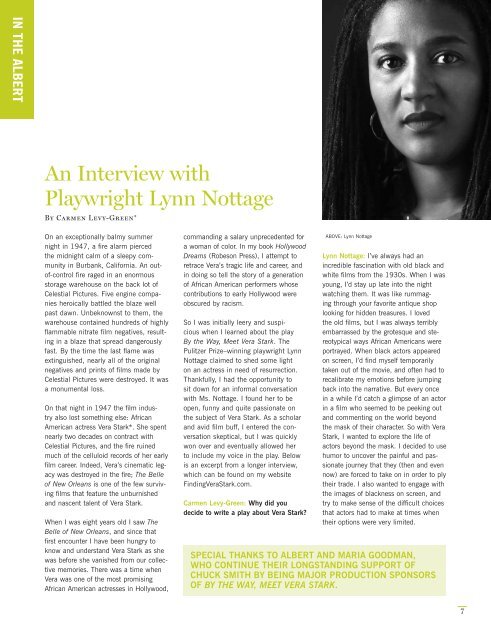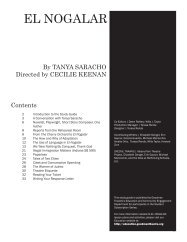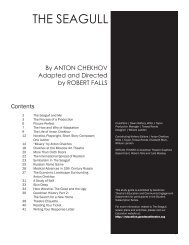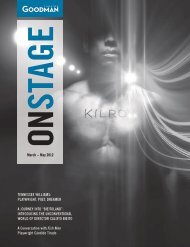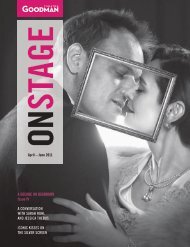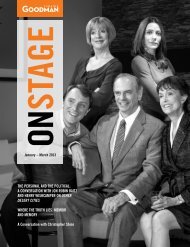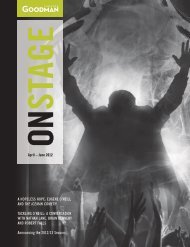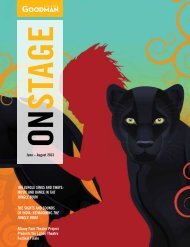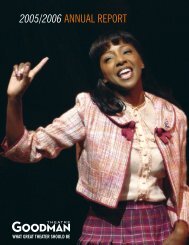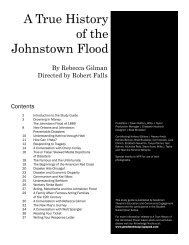BEYOND VERA STARK: HOLLYWOOD'S ... - Goodman Theatre
BEYOND VERA STARK: HOLLYWOOD'S ... - Goodman Theatre
BEYOND VERA STARK: HOLLYWOOD'S ... - Goodman Theatre
You also want an ePaper? Increase the reach of your titles
YUMPU automatically turns print PDFs into web optimized ePapers that Google loves.
IN THE ALBERT<br />
An Interview with<br />
Playwright Lynn Nottage<br />
By Carmen Levy-Green*<br />
On an exceptionally balmy summer<br />
night in 1947, a fire alarm pierced<br />
the midnight calm of a sleepy community<br />
in Burbank, California. An outof-control<br />
fire raged in an enormous<br />
storage warehouse on the back lot of<br />
Celestial Pictures. Five engine companies<br />
heroically battled the blaze well<br />
past dawn. Unbeknownst to them, the<br />
warehouse contained hundreds of highly<br />
flammable nitrate film negatives, resulting<br />
in a blaze that spread dangerously<br />
fast. By the time the last flame was<br />
extinguished, nearly all of the original<br />
negatives and prints of films made by<br />
Celestial Pictures were destroyed. It was<br />
a monumental loss.<br />
On that night in 1947 the film industry<br />
also lost something else: African<br />
American actress Vera Stark*. She spent<br />
nearly two decades on contract with<br />
Celestial Pictures, and the fire ruined<br />
much of the celluloid records of her early<br />
film career. Indeed, Vera’s cinematic legacy<br />
was destroyed in the fire; The Belle<br />
of New Orleans is one of the few surviving<br />
films that feature the unburnished<br />
and nascent talent of Vera Stark.<br />
When I was eight years old I saw The<br />
Belle of New Orleans, and since that<br />
first encounter I have been hungry to<br />
know and understand Vera Stark as she<br />
was before she vanished from our collective<br />
memories. There was a time when<br />
Vera was one of the most promising<br />
African American actresses in Hollywood,<br />
commanding a salary unprecedented for<br />
a woman of color. In my book Hollywood<br />
Dreams (Robeson Press), I attempt to<br />
retrace Vera’s tragic life and career, and<br />
in doing so tell the story of a generation<br />
of African American performers whose<br />
contributions to early Hollywood were<br />
obscured by racism.<br />
So I was initially leery and suspicious<br />
when I learned about the play<br />
By the Way, Meet Vera Stark. The<br />
Pulitzer Prize–winning playwright Lynn<br />
Nottage claimed to shed some light<br />
on an actress in need of resurrection.<br />
Thankfully, I had the opportunity to<br />
sit down for an informal conversation<br />
with Ms. Nottage. I found her to be<br />
open, funny and quite passionate on<br />
the subject of Vera Stark. As a scholar<br />
and avid film buff, I entered the conversation<br />
skeptical, but I was quickly<br />
won over and eventually allowed her<br />
to include my voice in the play. Below<br />
is an excerpt from a longer interview,<br />
which can be found on my website<br />
FindingVeraStark.com.<br />
Carmen Levy-Green: Why did you<br />
decide to write a play about Vera Stark?<br />
ABOVE: Lynn Nottage<br />
Lynn Nottage: I’ve always had an<br />
incredible fascination with old black and<br />
white films from the 1930s. When I was<br />
young, I’d stay up late into the night<br />
watching them. It was like rummaging<br />
through your favorite antique shop<br />
looking for hidden treasures. I loved<br />
the old films, but I was always terribly<br />
embarrassed by the grotesque and stereotypical<br />
ways African Americans were<br />
portrayed. When black actors appeared<br />
on screen, I’d find myself temporarily<br />
taken out of the movie, and often had to<br />
recalibrate my emotions before jumping<br />
back into the narrative. But every once<br />
in a while I’d catch a glimpse of an actor<br />
in a film who seemed to be peeking out<br />
and commenting on the world beyond<br />
the mask of their character. So with Vera<br />
Stark, I wanted to explore the life of<br />
actors beyond the mask. I decided to use<br />
humor to uncover the painful and passionate<br />
journey that they (then and even<br />
now) are forced to take on in order to ply<br />
their trade. I also wanted to engage with<br />
the images of blackness on screen, and<br />
try to make sense of the difficult choices<br />
that actors had to make at times when<br />
their options were very limited.<br />
SPECIAL THANKS TO ALBERT AND MARIA GOODMAN,<br />
WHO CONTINUE THEIR LONGSTANDING SUPPORT OF<br />
CHUCK SMITH BY BEING MAJOR PRODUCTION SPONSORS<br />
OF BY THE WAY, MEET <strong>VERA</strong> <strong>STARK</strong>.<br />
7


